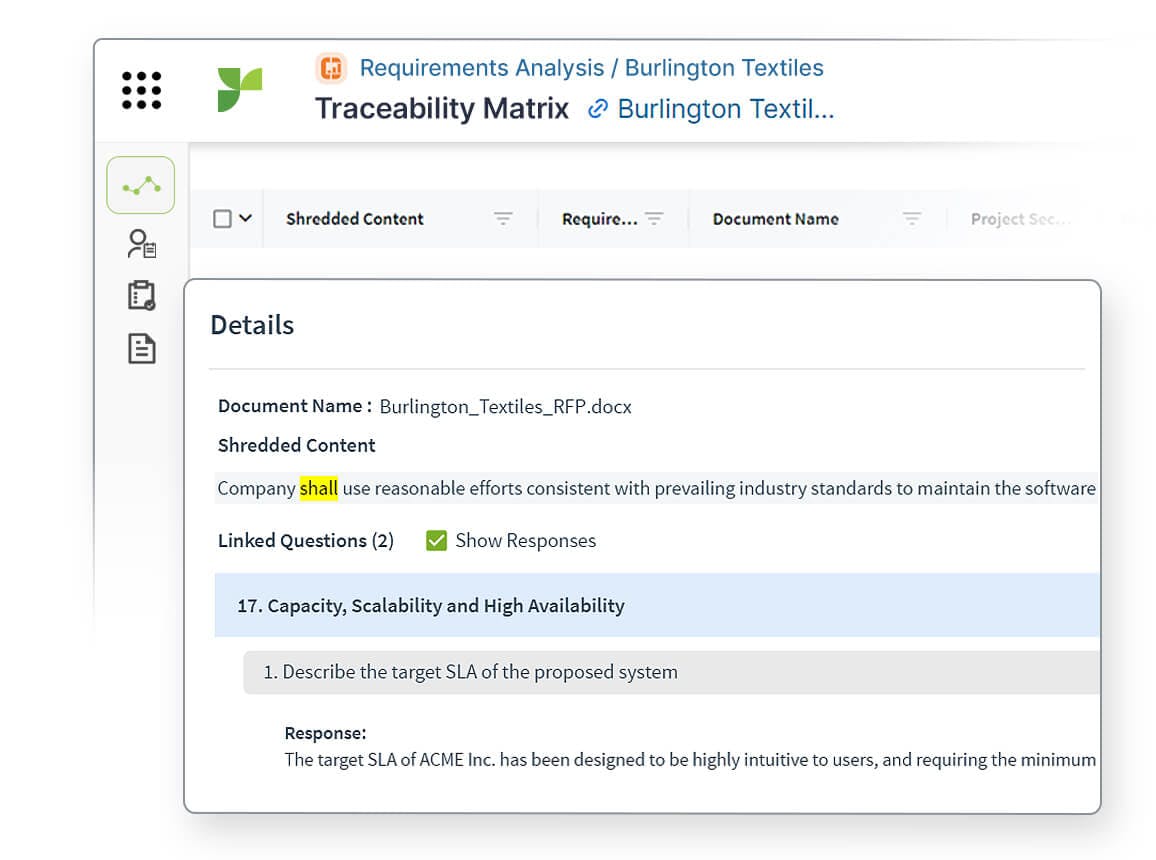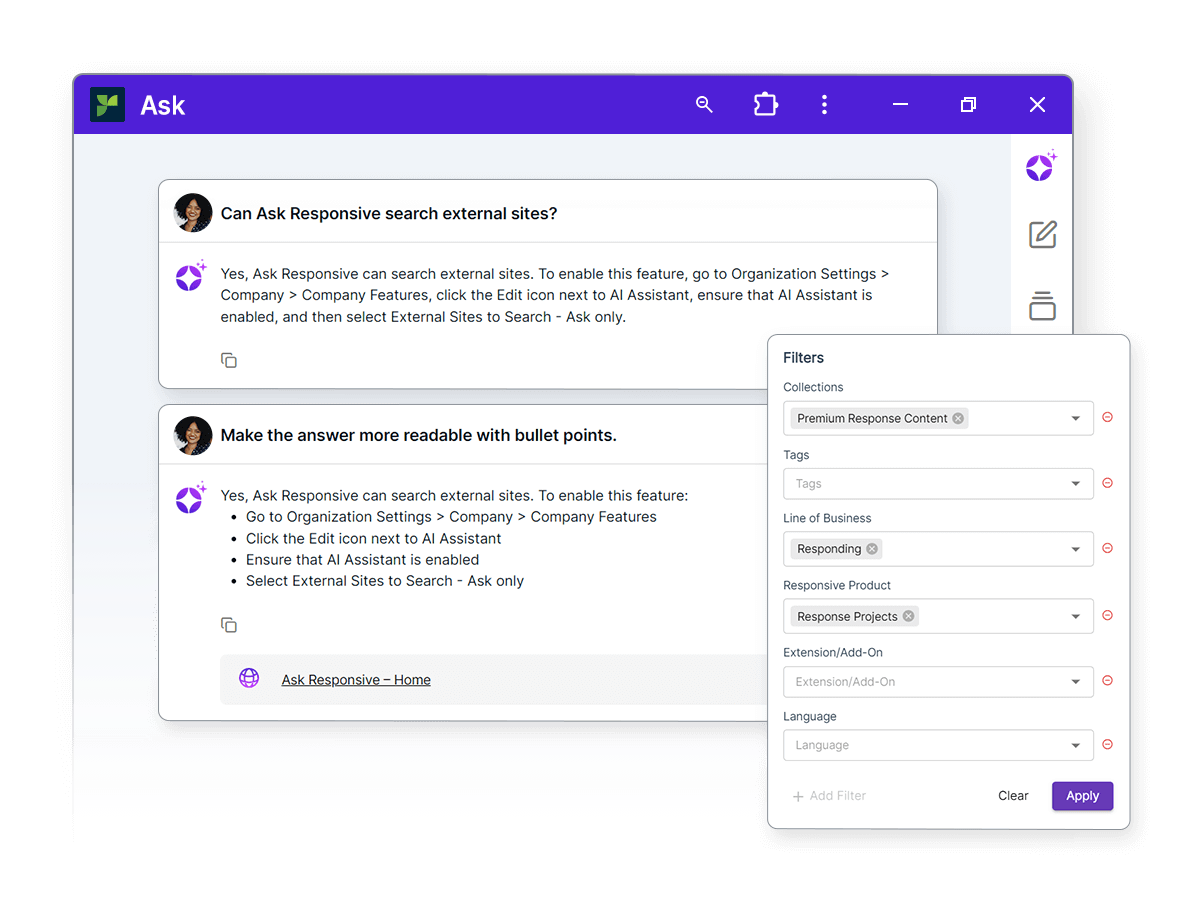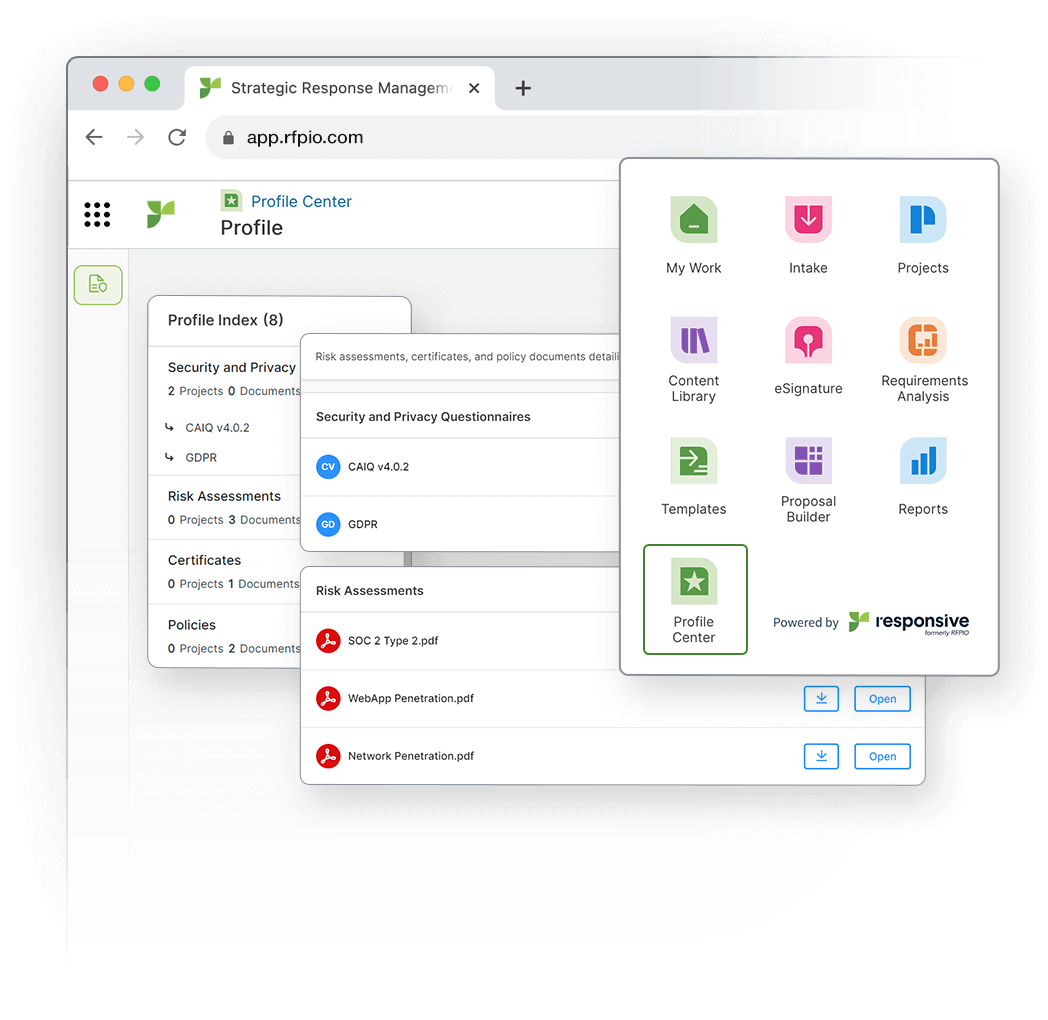Strategic Response Management (SRM) is quickly becoming a cornerstone of how businesses leverage existing and future organizational knowledge to build profitable growth. As adoption spreads beyond proposal teams to include sales, IT, InfoSec, customer success, and more, SRM is becoming indispensable in industries like financial services, technology, and manufacturing.
With B2B buyers demanding more information, faster turnaround, and airtight compliance, organizations are turning to SRM platforms to handle ad hoc questions, RFPs, DDQs, and security questionnaires, all of which are growing in volume and complexity. Their unique ecosystem of customer-facing content, project management, and automation also make SRM platforms particularly inviting to any company looking to safely execute AI mandates (AI threads its way into every SRM prediction mentioned below).
In 2024, we distilled SRM to its essence: the people, practices, and technology that unlock organizational knowledge for profitable growth.
It stands to reason that our predictions for SRM also revolve around:
- People: More teams will recognize SRM as a critical growth enabler
- Practices: Knowledge management will take center stage as AI evolves
- Technology: SRM success will hinge on more than just generative AI (GenAI)
- Organizational knowledge: New teams and technology will dip into more than just proposal content to generate personalized responses
- Profitable growth: Longer sales cycles will make it more important than ever to focus on the deals you have the best chance at winning
In crafting these predictions, at no time was a crystal ball consulted. These are based on what we see in our platform data and roadmap; what we hear from our customers; and what stands out when we consult our leadership, partners, and peers at key industry events.
Prediction 1: Knowledge management will determine success of AI in 2025
With GenAI adoption surging — 89% of organizations are experimenting with it to augment strategic response processes — knowledge management is more important than ever. It’s the bedrock of successful AI implementation, especially for SRM. Without a solid foundation of curated, up-to-date content, even the most advanced AI systems can falter.
As Forrester aptly warns, “Outdated or neglected knowledge repositories can propagate inaccurate or irrelevant information, resulting in the dreaded “hallucinations” that can plague generative AI systems. To combat this, organizations must prioritize the active curation and maintenance of their knowledge assets, ensuring that the information fed into the genAI models is accurate, up to date, and valuable.”
Knowledge management is also one of the biggest weaknesses of upstart generative AI RFP software players. Many rely on pre-trained large language models (LLMs) wrapped in custom interfaces, which offer limited functionality beyond generative AI (GenAI). These solutions often lack other critical types of AI — such as machine learning, natural language processing (NLP), and reinforcement learning — needed for managing content, analyzing deal fit, building proposal teams, and automating workflows. The result? Organizations risk sacrificing quality and efficiency when AI-enabled knowledge management is absent from an SRM platform.
We are also seeing an uptick in open reqs for knowledge managers, which would indicate that many organizations are already prioritizing knowledge management to get more out of AI. Ironically, without AI-enabled content management tools in place to support knowledge managers’ efforts to optimize organizational knowledge for effective AI output, they face an uphill battle. AI is here to stay, and mandates to figure out how to use it for competitive advantage are being handed to teams in companies of all sizes around the world.
As companies become more entrenched in AI, greater scrutiny will be placed on the health of their content. According to a recent Fast Company article, “Embracing AI in knowledge management is not just a technological upgrade — it’s a strategic necessity for every forward-thinking organization.”
How Responsive can help you prepare
Knowledge management was the key to accurate AI results when we initially built the Responsive Platform in 2015 with machine learning and predictive analytics at its core. We included a collaborative AI-supported knowledge management workflow to help customers improve the accuracy of intelligent search and recommendations that draw from their content library.
“We had to really overhaul our content library. We had a great library in place for a world without AI. But today you have to point AI to the right information, and you have to structure your content library around that.”
— Kristen Carloni, Global Head of Aladdin Business Proposal Strategy at BlackRock
Prediction 2: Effective SRM will require more than just GenAI
Organizations relying solely on GenAI RFP tools will begin to see diminishing returns. LLMs are the proverbial hammer for every AI nail, and that’s problematic when it comes to personalization, customization, and emulating your brand voice. The approach overlooks critical needs like knowledge management (see above), workflow automation, project management, and predictive analytics.
A deeper issue looms as LLMs consume and train on AI-generated content, potentially compounding inaccuracies and further degrading the quality of insights over time. To address these limitations, Specialized Language Models (SLMs) are gaining traction particularly as a supplement to — not a replacement for — LLMs. Unlike LLMs, SLMs are tailored for specific domains, offering precision and reduced reliance on generic training data. However, they come with their own challenges: they require significant expertise and resources to implement effectively, making them less accessible to many organizations (for now). Even so, Forrester Research predicts a 60% surge in SLM adoption in 2025 in Predictions 2025: Enterprise Software.
The future of SRM lies in intelligent automation that goes beyond simple GenAI for content generation. Teams will increasingly leverage AI across the entire opportunity lifecycle, with capabilities like:
- Deal fit analysis: Calculate the probability of winning based on past bids and RFP responses.
- Bulk response: Create first drafts of comprehensive proposals or answers to entire questionnaires.
- Executive summary and cover letter writing: Develop customized drafts based on the RFP you’re responding to as well as similar successful past RFPs.
- SME selection: Recommend the right subject matter experts (SMEs) based on past contributions and topic expertise.
- Compliance checks: Cross-check responses against regulatory guidelines, automatically flagging discrepancies or outdated information.
- Content auditing: Automate detailed audit trails and document every change and update, including who made changes, when they were made, and why, creating a clear line of accountability.
- AI-recommended responses using past projects: Generate a first draft of responses using the best answers from past projects.
- Virtual assistants/chatbots: Equip field teams with access to organizational knowledge via AI-powered conversational chatbots to find answers instantly — with source citations. Also, enable prospects to find the answers they need in complex documentation, such as responses to security questionnaires.
An SRM platform’s strength will depend on more than just the quality of its AI-generated responses. Speed must complement that quality to enable response teams to pursue more opportunities and demonstrate value to leadership. Beyond bid and proposal teams, other departments need to quickly and confidently respond to ad hoc prospect and customer inquiries. Additionally, scalability, streamlined workflows, and measurable business outcomes will be crucial factors in a platform’s value as a strategic partner — helping organizations win more opportunities, faster.
How Responsive can help you prepare
Responsive AI goes beyond simply generating responses. It empowers organizations with tools to unify cross-functional teams, ensure compliance, and drive revenue growth through consistent and compelling outputs, turning knowledge into a competitive advantage. Along with go/no-go analysis, SME selection, best-of recommendations, and automated response functionality, with Responsive AI your team can:
- Get fingertip access to trusted company content for real-time answers
- Create first draft responses to bids and questionnaires in minutes
- Refine and customize answers by using built-in and custom prompts
- Maintain and refine your content library with scoring and usage reports
“We use Responsive AI as part of our go/no-go process on proposals. The shredding capability allows us to quickly identify key themes, important dates and identify gaps. And running traceability before we submit makes sure that strategic answers are super polished and accurate.”
— Andrew Mersman, Senior Director of Solution Consulting at Netsmart

Prediction 3: Data-driven insights will be even more critical to scoring bigger wins
As SRM solutions grow in popularity, and as organizations gain more experience using them, they are being recognized for the value they provide beyond strategic response. These platforms are also rich data resources that provide invaluable insight to pursuit teams and go-to-market (GTM) strategies.
For example, by leveraging historical data and AI-supported opportunity fit analysis, bid and proposal teams will have diagnostic tools to assess the likelihood of success. Insight over intuition will drive better outcomes and elevate these teams as stewards of organizational knowledge and critical revenue drivers.
More organizations recognize the value of tracking project metrics and user activity. Response times, SME involvement, and proposal win rates are becoming benchmarks for identifying gaps, calculating ROI, and making informed decisions. We’ve also seen a spike in requests to set up personalized dashboards and custom reporting; cross-functional teams want to deliver actionable revenue, market, and product insights tailored to their organization’s unique needs.
Data also enables a two-way flow of information within your organization. Bid and proposal teams sit at the intersection of external inquiries and internal expertise. They are uniquely positioned to spot trends — such as the influx of AI questionnaires that are extending sales cycles — in what prospects are asking for and to identify content gaps and strengths. By capturing and sharing this data with teams like product and InfoSec, they can help shape offerings and improve go-to-market strategies. For example, the product team at Seismic — a leader in sales enablement software — relies on their proposal team counterparts to share market intelligence from RFX responses to inform product development.
As the role of bid and proposal teams expands, their ability to unlock actionable data will elevate their value to the organization. Establishing a culture of winning will rely on not just generating the best response but on collecting, analyzing, and applying insights from every response.
How Responsive can help you prepare
From the decision to pursue an opportunity to executing on how you plan to win it, Responsive data will guide the way. With custom dashboards and personalized reporting, Responsive enables bid and proposal teams to monitor performance metrics, identify areas for improvement, and spot trends in real time.
Responsive doesn’t just focus on the information you send out; it helps you capture the data coming in. From tracking prospect questions to identifying patterns in deal fit, the platform equips teams to communicate valuable insights across the organization. Product teams will have a better understanding of what customers want, leadership will have the data necessary to make confident decisions, and sales teams will be able to gauge the likelihood of winning proposals based on historical data and opportunity fit.
“The metrics you’re able to pull from Responsive can give you so many ideas on how to communicate. Communicating those metrics to your leadership — not just your win rate, but the impact you drive for the rest of the company — shows them that you are here to help win the business.”
— Amanda Heather, Director, Strategy and Operations at Microsoft
Prediction 4: You will be able to do more without adding headcount (AI agents and AI assistants will be involved)
Tighter budgets and increasing demands will force organizations to accomplish more with fewer resources. SRM is not immune. Smaller teams will be expected to deliver high-quality proposals under tight, and often competing, deadlines. To rise to the challenge, these teams are experimenting with AI agents and AI assistants to lighten the load.
AI agents are autonomous and semi-autonomous systems designed to perform certain tasks with you or for you. We are in the early days of AI agents that rely on machine learning and natural language processing (NLP) like conversational AI chatbots, but key characteristics include:
- Autonomy: Operating with minimal human intervention and capable of making decisions or taking actions within a predefined scope.
- Adaptivity: Learning from their environment and past interactions, using machine learning to improve over time.
- Purpose-driven: Designed with a specific objective in mind, such as recommending information or automating a process.
In SRM, AI agents will help bid, proposal, and revenue teams complete key tasks with greater intelligence, accuracy, and precision. These tasks will include:
- Go/no-go decision-making based on win-loss history of comparable opportunities
- Document analysis and shredding
- Benchmarking offerings against customer requirements and potentially competing proposals, which will identify gaps and strengths in their capabilities
- Writing a first draft
- Ensuring that all information provided in a response adheres to the required standards and regulatory guidelines
These and other capabilities will free up valuable time, allowing proposal managers and SMEs to focus on complex, high-value responses that will make the most impact.
AI assistants cannot take action unless prompted. They are typically characterized by:
- Reactivity: A conversational AI interface understands your natural language commands.
- Human interactivity: Decision-making is based on predefined rules and user commands, and they require direct user interaction.
- User interface: Unlike AI agents (with minimal or no UI), AI assistants have an intuitive interface for users to easily ask it to complete routine tasks and information retrieval.
AI assistants in SRM will provide recommendations and answer questions based on their ability to draw from the knowledge base they’re authorized to access. Use cases for AI assistants are far and wide, including equipping all teams with easy access to SRM content to improve consistency and confidence in responses to every external request; responding to bids and questionnaires in online portals; and retrieving specific details from complex documents.
According to Predictions 2025: B2B Marketing, Sales, and Product from Forrester Research, AI “coworkers” with enhanced predictive, conversational, and generative capabilities are expected to play a critical role in two out of five organizations. In the case of SRM, AI agents and AI assistants will help revenue teams meet growing demands while maintaining the quality and precision required to win business. The key to deriving value from these systems will be balancing automation with human oversight to efficiently support and oversee AI agents and AI assistants, govern content, manage projects, and generate responses.
How Responsive can help you prepare
By giving you AI assistive tools to help you complete tasks more efficiently with confidence. Responsive AI learns how your team works. With experience, it can automatically answer questions, recommend SMEs for topics, and guide users to the best content.

Responsive AI actually already includes AI agents (the ability to create first drafts with the push of a button) and AI assistants (Ask) that you can rely on as “coworkers.” Additional agents manage document analysis and shredding. An AI compliance analysis agent is on the near horizon, while a content cleanup agent is further out.
“Strategic Response Management solutions save you time, money, and improve the quality and accuracy of your responses. Companies must guard against complacency and need to understand how quickly things are changing in the proposal world.”
— Autumn Wenner, Content Proposal Specialist at JAGGAER
Prediction 5: RFP and bid volume and complexity will increase
Based on the 2024 State of Strategic Response Management Report, 77% of organizations say the volume of work associated with RFPs and bids increased over the past year. RFP complexity spiked to as much as 94%. This trend shows no sign of slowing down, particularly as buyers demand more detailed information and rigorous evaluations in every proposal. According to the, nearly half of organizations (48%) report increasing buyer requirements, and 52% say they need to provide more information to close deals.
Adding to this complexity is the rising prevalence of AI-related assessments in RFPs. Questions like, “How are you using AI?” are now standard, reflecting buyer concerns about the ethical, strategic, and technical implications of artificial intelligence. As vendors increasingly tout AI capabilities, CIOs are taking a more active role in vendor evaluation to mitigate risks and avoid pitfalls of over-promised benefits. In 2025, CIOs will demand proofs of concept (POCs) before investing, and Forrester Research (Predictions 2025: Artificial Intelligence) predicts the emergence of Chief Data Officers (CDOs) to help organizations evaluate and manage AI offerings effectively.
The UK is experiencing its own transformation with the Procurement Act 2023 (PA23), which takes effect on February 24, 2025. This regulation aims to open procurement opportunities to smaller businesses and social enterprises while embedding transparency across contract lifecycles. It also ushers in a significant shift from the Most Economically Advantageous Tender (MEAT) to the Most Advantageous Tender (MAT), empowering buyers to prioritize quality, social value, and public benefit over price when evaluating bids. This change will require organizations to craft more thoughtful, tailored proposals to stand out in a values-driven procurement landscape.
For all organizations, these changes represent an inflection point. As RFP and bid requirements grow in volume and complexity, the ability to respond quickly, accurately, and strategically will be a decisive factor in winning business.
How Responsive can help you prepare
Intelligent automation and advanced AI help even smaller teams keep up with increasing volume even as requests grow more complex. Specifically, Responsive is ready to:
- Analyze and respond to highly complex, narrative bids and RFXs
- Help teams align with MAT criteria, and give them more time to focus on highlighting social value, quality, and public benefit
- Facilitate CIO and CDO involvement with detailed reporting and compliance tracking
Check out how Jumio conquered these challenges and doubled the number of RFPs answered while increasing win rate by 20%.
“Competition is higher than ever. Supply chain teams are evolving and RFPs are getting more sophisticated. We are constantly having to up our game in terms of quality of responses, including new content to make sure bids are not only compliant, but compelling enough to stand out in a crowded field.”
— Darlene Smith, Pursuit Centre Manager at Fujitsu
Prediction 6: SRM will be mission-critical for Sales, InfoSec, and other teams to meet 2025 goals
Bid and proposal teams aren’t the only ones under pressure to deliver timely, accurate information. Sales, InfoSec, customer success, presales, marketing, legal, HR, and all other teams who respond to proposal requests, questionnaires, assessments, or ad hoc customer queries will benefit from SRM. For example, sales and customer success teams use pre-approved templates in Responsive for straightforward proposals. That way bid and proposal teams can be selective about which proposals they handle and which can be completed through self-service.
All teams derive value from SRM by accessing the curated content library from applications where they’re already working and from AI assistants. Leading SRM platforms integrate seamlessly with the tools and systems that drive modern business processes. Alongside the most popular CRMs, ERPs, sales enablement, and productivity applications, SRM platforms will create unified ecosystems where data flows effortlessly, eliminating silos and enhancing efficiency. Whether it’s through an integration with Slack to enhance collaboration or with analytics tools to boost AI-powered insights for sales, marketing, and operational strategies, organizations will be able to maximize ROI in 2025 by scaling their SRM platform for multiple use cases.
AI assistants like Ask give teams access to organizational knowledge within SRM platforms without working directly in the platform. Simply open the desktop app for conversational Q&A, and leverage the proposal-ready content for whatever your team needs.
- Sales teams will be accurately answering ad hoc customer questions in real time during calls, demos, and virtual meetings.
- InfoSec teams will quickly knock out questionnaires in portals or create first draft responses to common questionnaires in minutes.
- InfoSec and IT teams will manage trust centers for easy, proactive sharing of security, compliance, and privacy information
- Legal and HR teams will simplify workflows and accelerate turnaround of DEI and ESG assessments.
Heavily regulated industries like Financial Services will realize massive efficiency gains by using SRM to respond to due diligence questionnaires. Not only will SRM platforms automate much of the response process, they will also improve accuracy and compliance.
How Responsive can help you prepare
Responsive already has seamless integrations in place for many of the applications you already use, including Salesforce, Seismic, Door, and Microsoft Word, Excel, PowerPoint, Teams, and SharePoint. You can also connect to other applications using the Responsive API.
Ask equips sales and customer success teams with the ability to answer ad hoc customer questions (with sources cited) directly from your organizational knowledge. In addition to using GenAI to draw from your Responsive Content Library, you can also connect Ask to external sites that you trust, like your help center or company wiki.

Finally, with Responsive Profile Center, you can proactively share your security posture and build a trust center where clients can use AI-enabled search to find specific details that will put them at ease.
Proposal-ready content is your best content, and through an AI-enabled SRM platform, every team in your organization will be able to access it for personalized responses, real-time customer interactions, faster decision-making, and consistent messaging across all touchpoints.
“[Ask is] built on the foundation of our proposal content. That’s great because the customer might ask the sellers and my proposal team an ad hoc question. They can use Ask to source that content on the platform.”
— Carrie Jordan, Global Director of Proposals at Microsoft, on Diginomica
SRM 2025: An organizational imperative to keep up with competitors
2025 will be an inflection point: You either adopt AI-powered SRM or face an insurmountable distance to catch up to the rest of the pack. Those that adopt it will use it as a revenue generation force multiplier to set a standard for procurement teams that laggards cannot attain with a manual approach, point solutions, or GenAI alone.
The future is clear: SRM isn’t just a tool; it’s a strategy. It’s a way for organizations to align their people, practices, and technology to not only meet 2025 challenges but turn them into opportunities for growth. And who doesn’t want to be the team that’s both efficient and unbeatable?
Whether it’s tackling a tidal wave of RFPs, impressing increasingly skeptical CIOs, or helping your InfoSec team crush questionnaires faster than they can say “compliance,” SRM is the glue binding your business goals with actionable results. It’s the partner your team didn’t know they needed but can’t imagine living without.
With SRM on your side, AI mandates will not only be met, they’ll be actioned and supported by data that you’ll share with leadership. Teams will be unified on customer and prospect-facing messaging and content. Proposals will be personalized, accurate, and submitted on time. Fewer opportunities will be missed or lost as a result of strained resources or expertise bottlenecks. In other words, 2025 will be a year of more frequent wins and stress-free growth.
Ready to see how adopting SRM now will help you make more of an impact in 2025 than you did in 2024? Request a demo.
